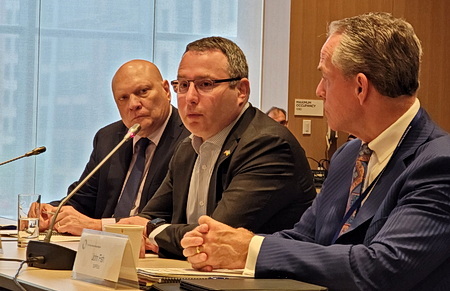
National lawmakers and Real Estate Roundtable members met this week to discuss domestic and geopolitical issues affecting the economy and industry—including inflation and the Fed; the congressional legislative agenda; and the war in Ukraine. The Roundtable’s 2022 Spring Meeting also featured a discussion on climate-related financial and regulatory proposals. (Roundtable April 2022 Policy Issue Profiles and Executive Summary)
Senator Sinema & Market Conditions

Ukraine, Climate and the Fed
 A 20-year military veteran, former Director with the White House’s National Security Council, and now a senior advisor with VetVoice Foundation, Mr. Vindman addressed the war in Ukraine. “It is a geopolitical earthquake that will shape how power is used in the 21st century,” Vindman said, adding that an eventual reconstruction effort will require a massive international effort involving public-private partnerships and private equity. (Photo: left to right, Jeffrey DeBoer, Mr. Vindman, and John Fish)
A 20-year military veteran, former Director with the White House’s National Security Council, and now a senior advisor with VetVoice Foundation, Mr. Vindman addressed the war in Ukraine. “It is a geopolitical earthquake that will shape how power is used in the 21st century,” Vindman said, adding that an eventual reconstruction effort will require a massive international effort involving public-private partnerships and private equity. (Photo: left to right, Jeffrey DeBoer, Mr. Vindman, and John Fish)
 A Roundtable panel addressed climate-related issues and their impact on investor demand, property values and interest rates. (Video of the discussion). The panel also discussed regulatory issues such as the SEC’s proposed climate risk disclosure rule. (Roundtable Weekly, March 25). Speakers included:
A Roundtable panel addressed climate-related issues and their impact on investor demand, property values and interest rates. (Video of the discussion). The panel also discussed regulatory issues such as the SEC’s proposed climate risk disclosure rule. (Roundtable Weekly, March 25). Speakers included:
 Warsh, above left, a former member of the Fed Board of Governors (2006-2011), discussed the Fed’s potential actions to temper inflation and guide the economy to a “soft landing” with Roundtable Member Scott Rechler, right, (Chairman & CEO, RXR Realty), who serves on the Federal Reserve Bank of New York’s Board of Directors.
Warsh, above left, a former member of the Fed Board of Governors (2006-2011), discussed the Fed’s potential actions to temper inflation and guide the economy to a “soft landing” with Roundtable Member Scott Rechler, right, (Chairman & CEO, RXR Realty), who serves on the Federal Reserve Bank of New York’s Board of Directors. Next on The Roundtable's meeting calendar is the all-member June 16-17 Annual Meeting in Washington, DC.
# # #
The Roundtable submitted comments this week to address the potential negative consequences of recently proposed Securities and Exchange Commission (SEC) regulations affecting real estate private equity investment fund advisers. (SEC comment letter, April 25)
Negative Consequences
Interrelated, Multiple Rulemakings

The Roundtable’s Real Estate Capital Policy Advisory Committee (RECPAC) will continue to engage the SEC on its various rulemakings and address individual proposals in more detail at its next meeting on June 16 during The Roundtable’s all-member June 16-17 Annual Meeting.
# # #
 The Real Estate Roundtable and four other national trade groups submitted recommendations to modify proposed Treasury regulations regarding partnerships and other pass-through entities that own direct or indirect interests in a passive foreign investment company (PFIC). (Read PFIC comment letter, April 25)
Passive Foreign Investment Companies and Proposed Regulations
The Real Estate Roundtable and four other national trade groups submitted recommendations to modify proposed Treasury regulations regarding partnerships and other pass-through entities that own direct or indirect interests in a passive foreign investment company (PFIC). (Read PFIC comment letter, April 25)
Passive Foreign Investment Companies and Proposed Regulations
